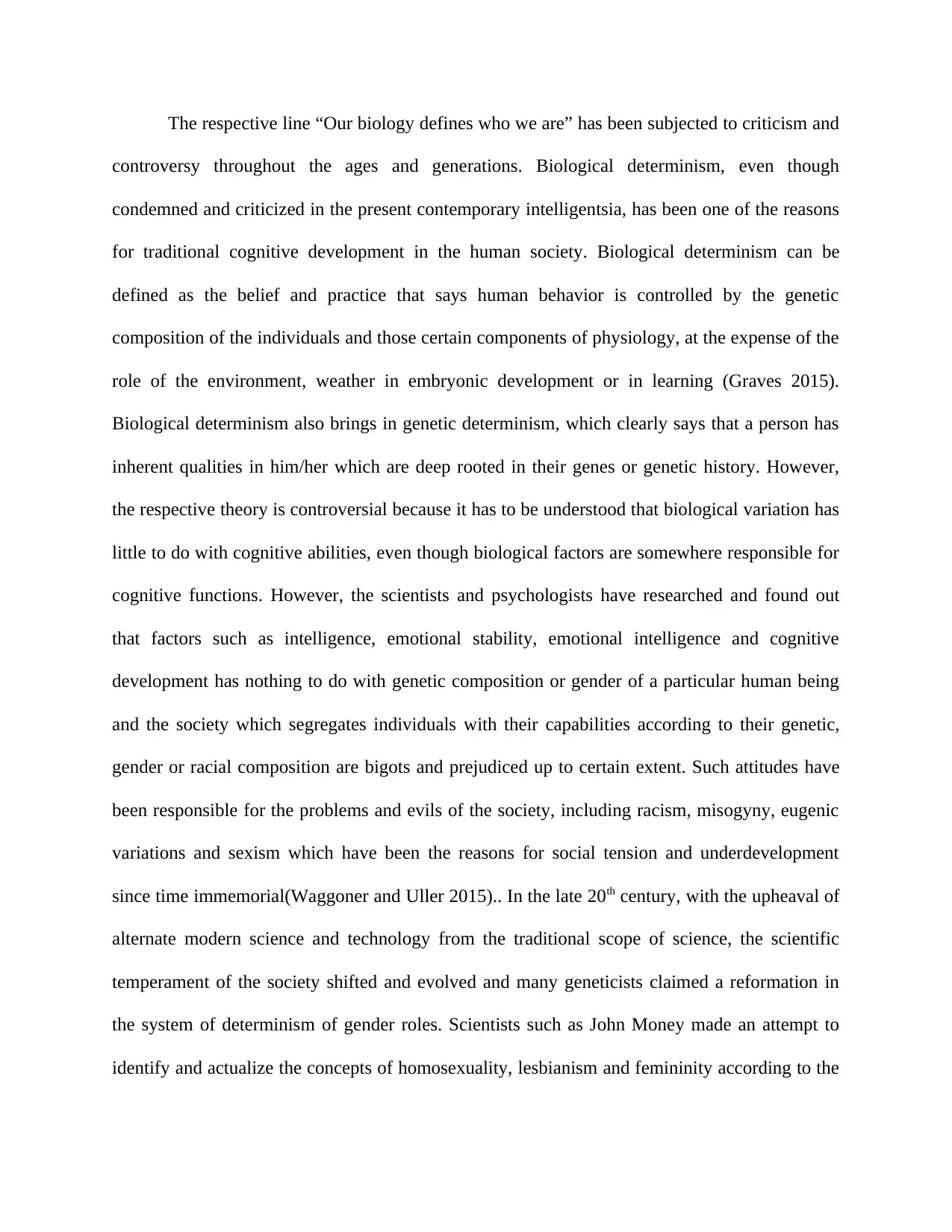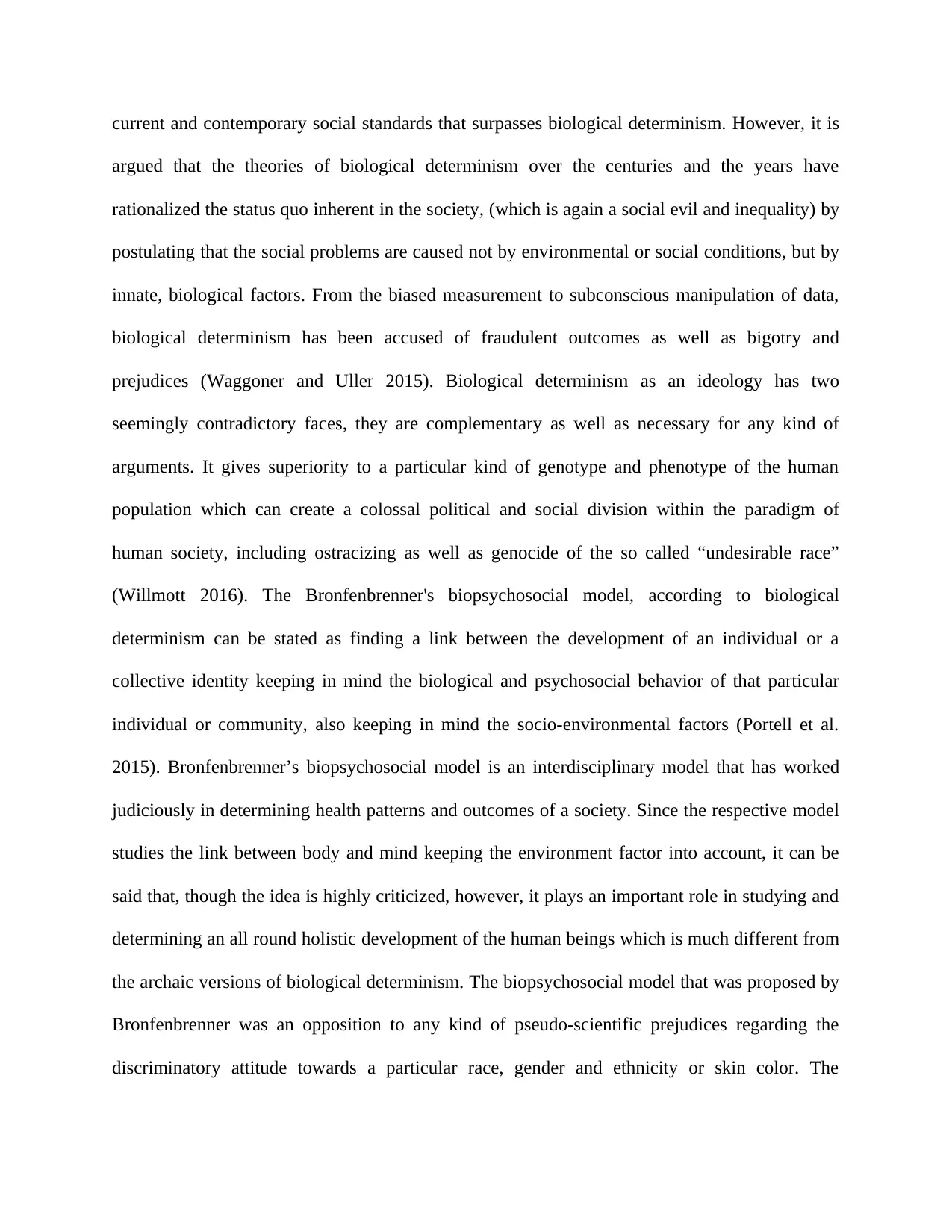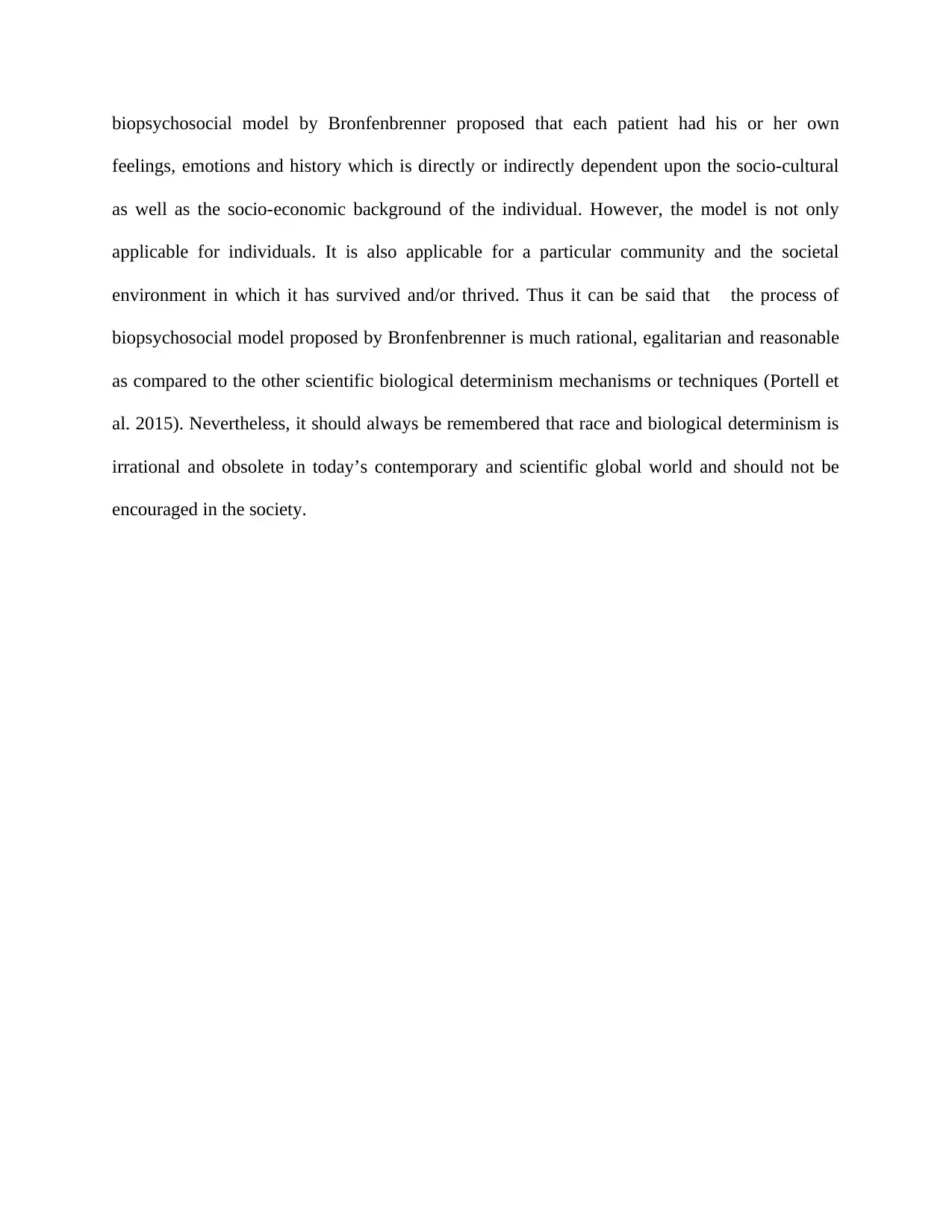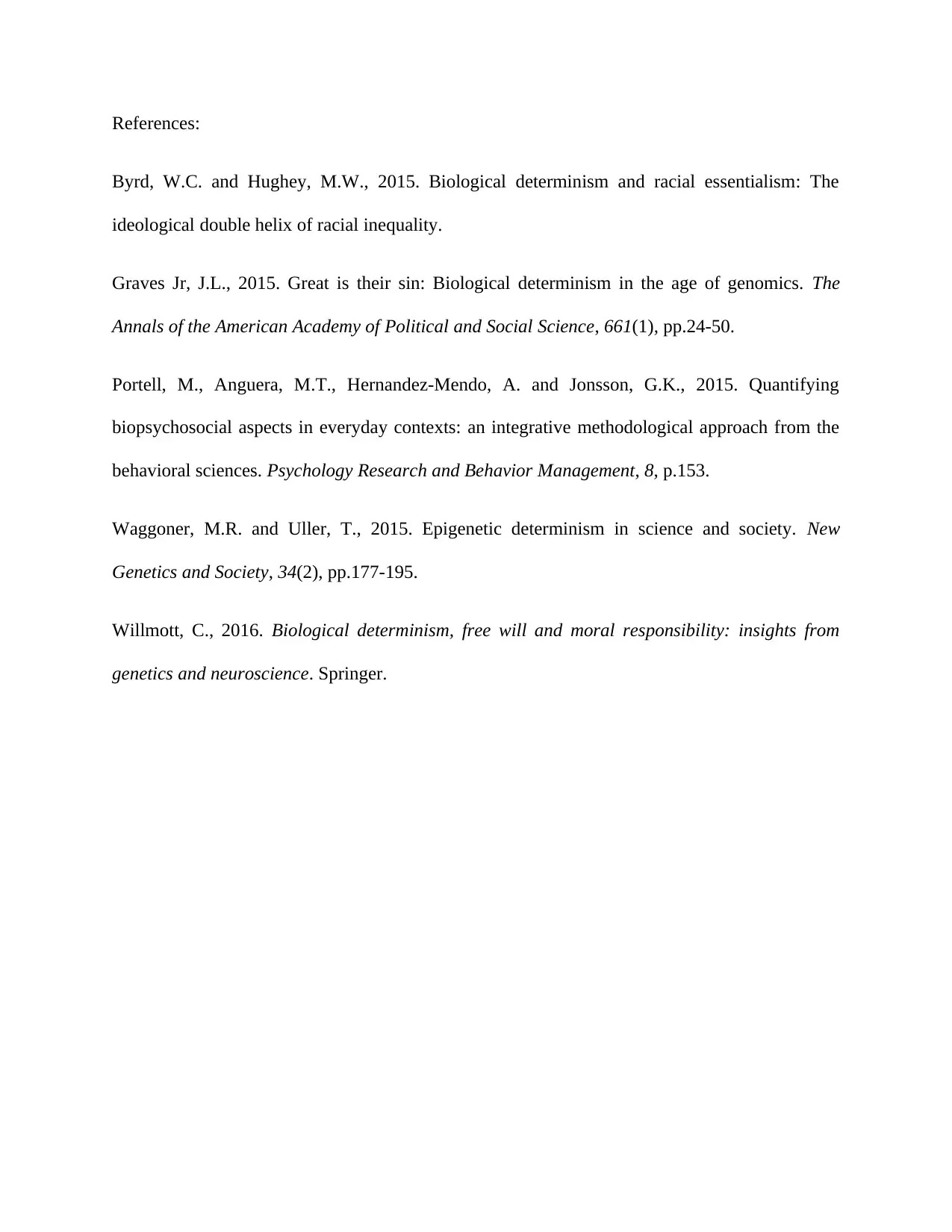Analysis of Biological Construct, Determinism, and Society's Impact
VerifiedAdded on 2023/01/11
|5
|1020
|37
Essay
AI Summary
This essay delves into the concept of biological determinism, exploring its historical context, criticisms, and the impact of genetic and biological factors on human behavior. It examines the arguments surrounding biological determinism, including its influence on societal structures and the development of cognitive abilities. The essay then contrasts biological determinism with the Bronfenbrenner's biopsychosocial model, highlighting its interdisciplinary approach in understanding health patterns, individual development, and the interplay between biological, psychological, and social-environmental factors. The author critiques biological determinism's potential for promoting social inequalities and emphasizes the importance of considering a more holistic and egalitarian approach to understanding human behavior, race, and societal dynamics.

Running head: BIOLOGICAL CONSTRUCT
BIOLOGICAL CONSTRUCT
Name of the student
Name of the university
Author Note
BIOLOGICAL CONSTRUCT
Name of the student
Name of the university
Author Note
Paraphrase This Document
Need a fresh take? Get an instant paraphrase of this document with our AI Paraphraser

The respective line “Our biology defines who we are” has been subjected to criticism and
controversy throughout the ages and generations. Biological determinism, even though
condemned and criticized in the present contemporary intelligentsia, has been one of the reasons
for traditional cognitive development in the human society. Biological determinism can be
defined as the belief and practice that says human behavior is controlled by the genetic
composition of the individuals and those certain components of physiology, at the expense of the
role of the environment, weather in embryonic development or in learning (Graves 2015).
Biological determinism also brings in genetic determinism, which clearly says that a person has
inherent qualities in him/her which are deep rooted in their genes or genetic history. However,
the respective theory is controversial because it has to be understood that biological variation has
little to do with cognitive abilities, even though biological factors are somewhere responsible for
cognitive functions. However, the scientists and psychologists have researched and found out
that factors such as intelligence, emotional stability, emotional intelligence and cognitive
development has nothing to do with genetic composition or gender of a particular human being
and the society which segregates individuals with their capabilities according to their genetic,
gender or racial composition are bigots and prejudiced up to certain extent. Such attitudes have
been responsible for the problems and evils of the society, including racism, misogyny, eugenic
variations and sexism which have been the reasons for social tension and underdevelopment
since time immemorial(Waggoner and Uller 2015).. In the late 20th century, with the upheaval of
alternate modern science and technology from the traditional scope of science, the scientific
temperament of the society shifted and evolved and many geneticists claimed a reformation in
the system of determinism of gender roles. Scientists such as John Money made an attempt to
identify and actualize the concepts of homosexuality, lesbianism and femininity according to the
controversy throughout the ages and generations. Biological determinism, even though
condemned and criticized in the present contemporary intelligentsia, has been one of the reasons
for traditional cognitive development in the human society. Biological determinism can be
defined as the belief and practice that says human behavior is controlled by the genetic
composition of the individuals and those certain components of physiology, at the expense of the
role of the environment, weather in embryonic development or in learning (Graves 2015).
Biological determinism also brings in genetic determinism, which clearly says that a person has
inherent qualities in him/her which are deep rooted in their genes or genetic history. However,
the respective theory is controversial because it has to be understood that biological variation has
little to do with cognitive abilities, even though biological factors are somewhere responsible for
cognitive functions. However, the scientists and psychologists have researched and found out
that factors such as intelligence, emotional stability, emotional intelligence and cognitive
development has nothing to do with genetic composition or gender of a particular human being
and the society which segregates individuals with their capabilities according to their genetic,
gender or racial composition are bigots and prejudiced up to certain extent. Such attitudes have
been responsible for the problems and evils of the society, including racism, misogyny, eugenic
variations and sexism which have been the reasons for social tension and underdevelopment
since time immemorial(Waggoner and Uller 2015).. In the late 20th century, with the upheaval of
alternate modern science and technology from the traditional scope of science, the scientific
temperament of the society shifted and evolved and many geneticists claimed a reformation in
the system of determinism of gender roles. Scientists such as John Money made an attempt to
identify and actualize the concepts of homosexuality, lesbianism and femininity according to the

current and contemporary social standards that surpasses biological determinism. However, it is
argued that the theories of biological determinism over the centuries and the years have
rationalized the status quo inherent in the society, (which is again a social evil and inequality) by
postulating that the social problems are caused not by environmental or social conditions, but by
innate, biological factors. From the biased measurement to subconscious manipulation of data,
biological determinism has been accused of fraudulent outcomes as well as bigotry and
prejudices (Waggoner and Uller 2015). Biological determinism as an ideology has two
seemingly contradictory faces, they are complementary as well as necessary for any kind of
arguments. It gives superiority to a particular kind of genotype and phenotype of the human
population which can create a colossal political and social division within the paradigm of
human society, including ostracizing as well as genocide of the so called “undesirable race”
(Willmott 2016). The Bronfenbrenner's biopsychosocial model, according to biological
determinism can be stated as finding a link between the development of an individual or a
collective identity keeping in mind the biological and psychosocial behavior of that particular
individual or community, also keeping in mind the socio-environmental factors (Portell et al.
2015). Bronfenbrenner’s biopsychosocial model is an interdisciplinary model that has worked
judiciously in determining health patterns and outcomes of a society. Since the respective model
studies the link between body and mind keeping the environment factor into account, it can be
said that, though the idea is highly criticized, however, it plays an important role in studying and
determining an all round holistic development of the human beings which is much different from
the archaic versions of biological determinism. The biopsychosocial model that was proposed by
Bronfenbrenner was an opposition to any kind of pseudo-scientific prejudices regarding the
discriminatory attitude towards a particular race, gender and ethnicity or skin color. The
argued that the theories of biological determinism over the centuries and the years have
rationalized the status quo inherent in the society, (which is again a social evil and inequality) by
postulating that the social problems are caused not by environmental or social conditions, but by
innate, biological factors. From the biased measurement to subconscious manipulation of data,
biological determinism has been accused of fraudulent outcomes as well as bigotry and
prejudices (Waggoner and Uller 2015). Biological determinism as an ideology has two
seemingly contradictory faces, they are complementary as well as necessary for any kind of
arguments. It gives superiority to a particular kind of genotype and phenotype of the human
population which can create a colossal political and social division within the paradigm of
human society, including ostracizing as well as genocide of the so called “undesirable race”
(Willmott 2016). The Bronfenbrenner's biopsychosocial model, according to biological
determinism can be stated as finding a link between the development of an individual or a
collective identity keeping in mind the biological and psychosocial behavior of that particular
individual or community, also keeping in mind the socio-environmental factors (Portell et al.
2015). Bronfenbrenner’s biopsychosocial model is an interdisciplinary model that has worked
judiciously in determining health patterns and outcomes of a society. Since the respective model
studies the link between body and mind keeping the environment factor into account, it can be
said that, though the idea is highly criticized, however, it plays an important role in studying and
determining an all round holistic development of the human beings which is much different from
the archaic versions of biological determinism. The biopsychosocial model that was proposed by
Bronfenbrenner was an opposition to any kind of pseudo-scientific prejudices regarding the
discriminatory attitude towards a particular race, gender and ethnicity or skin color. The
⊘ This is a preview!⊘
Do you want full access?
Subscribe today to unlock all pages.

Trusted by 1+ million students worldwide

biopsychosocial model by Bronfenbrenner proposed that each patient had his or her own
feelings, emotions and history which is directly or indirectly dependent upon the socio-cultural
as well as the socio-economic background of the individual. However, the model is not only
applicable for individuals. It is also applicable for a particular community and the societal
environment in which it has survived and/or thrived. Thus it can be said that the process of
biopsychosocial model proposed by Bronfenbrenner is much rational, egalitarian and reasonable
as compared to the other scientific biological determinism mechanisms or techniques (Portell et
al. 2015). Nevertheless, it should always be remembered that race and biological determinism is
irrational and obsolete in today’s contemporary and scientific global world and should not be
encouraged in the society.
feelings, emotions and history which is directly or indirectly dependent upon the socio-cultural
as well as the socio-economic background of the individual. However, the model is not only
applicable for individuals. It is also applicable for a particular community and the societal
environment in which it has survived and/or thrived. Thus it can be said that the process of
biopsychosocial model proposed by Bronfenbrenner is much rational, egalitarian and reasonable
as compared to the other scientific biological determinism mechanisms or techniques (Portell et
al. 2015). Nevertheless, it should always be remembered that race and biological determinism is
irrational and obsolete in today’s contemporary and scientific global world and should not be
encouraged in the society.
Paraphrase This Document
Need a fresh take? Get an instant paraphrase of this document with our AI Paraphraser

References:
Byrd, W.C. and Hughey, M.W., 2015. Biological determinism and racial essentialism: The
ideological double helix of racial inequality.
Graves Jr, J.L., 2015. Great is their sin: Biological determinism in the age of genomics. The
Annals of the American Academy of Political and Social Science, 661(1), pp.24-50.
Portell, M., Anguera, M.T., Hernandez-Mendo, A. and Jonsson, G.K., 2015. Quantifying
biopsychosocial aspects in everyday contexts: an integrative methodological approach from the
behavioral sciences. Psychology Research and Behavior Management, 8, p.153.
Waggoner, M.R. and Uller, T., 2015. Epigenetic determinism in science and society. New
Genetics and Society, 34(2), pp.177-195.
Willmott, C., 2016. Biological determinism, free will and moral responsibility: insights from
genetics and neuroscience. Springer.
Byrd, W.C. and Hughey, M.W., 2015. Biological determinism and racial essentialism: The
ideological double helix of racial inequality.
Graves Jr, J.L., 2015. Great is their sin: Biological determinism in the age of genomics. The
Annals of the American Academy of Political and Social Science, 661(1), pp.24-50.
Portell, M., Anguera, M.T., Hernandez-Mendo, A. and Jonsson, G.K., 2015. Quantifying
biopsychosocial aspects in everyday contexts: an integrative methodological approach from the
behavioral sciences. Psychology Research and Behavior Management, 8, p.153.
Waggoner, M.R. and Uller, T., 2015. Epigenetic determinism in science and society. New
Genetics and Society, 34(2), pp.177-195.
Willmott, C., 2016. Biological determinism, free will and moral responsibility: insights from
genetics and neuroscience. Springer.
1 out of 5
Your All-in-One AI-Powered Toolkit for Academic Success.
+13062052269
info@desklib.com
Available 24*7 on WhatsApp / Email
![[object Object]](/_next/static/media/star-bottom.7253800d.svg)
Unlock your academic potential
Copyright © 2020–2026 A2Z Services. All Rights Reserved. Developed and managed by ZUCOL.

